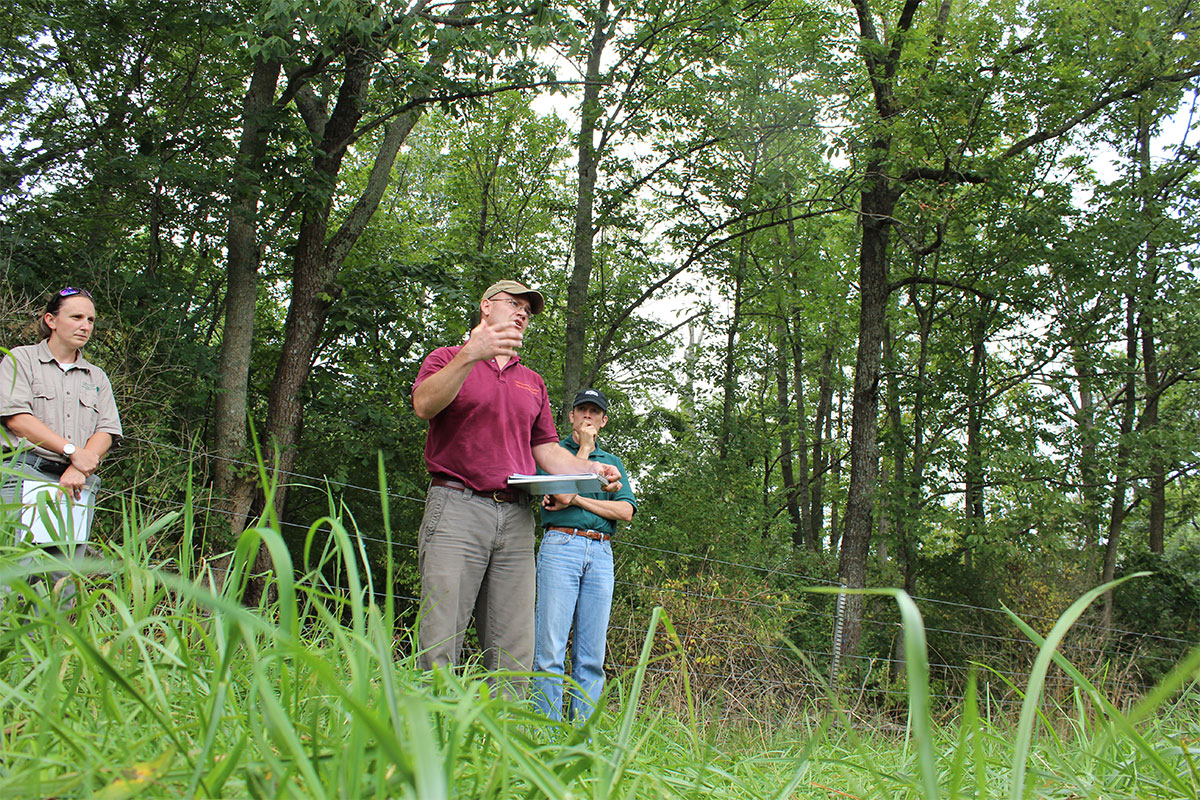
Putting research in the hands of Virginians
Every day, in every corner of the commonwealth, Agency 229 is making a positive impact on people's lives. It starts with innovative research conducted by scientists and specialists at Virginia Tech and the 11 Agricultural Research and Extension Centers strategically located around the state. This research is then shared with Virginia Cooperative Extension agents who are fanned out across the commonwealth and work with citizens to provide practical education to help individuals, businesses, and communities.
This is the heart of our land-grant mission: creating knowledge and sharing it with the world to help our communities thrive. It’s what Virginia Tech has done for nearly 150 years and will continue to do for generations to come.
Agency 229 is making an impact in your community →
Researchers at the Virginia Tech campus are working on ways to raise cattle, sheep, pigs, and chickens to feed families across the state and the globe.
Enhancing yields, improving quality, and helping Virginia producers market globally
Each day, Virginia Tech experts partner with producers across the state to enhance the quality of their soils, improve their yields, and strengthen their animals. The partnership doesn't end there. These experts also help secure markets and profits for these valuable products.
The success of each and every producer in the commonwealth helps ensure that citizens from each corner of the state may share in the bounty. Virginia Cooperative Extension also works through farmers markets and other means to provide low-income residents with access to fresh, nutritious foods.
The research and Extension know-how required to support robust food production and distribution are critical — not only to residents of the commonwealth, but to the 2 billion new residents who will join our ranks across the globe.
In 30 years, 9.7 billion people will populate the planet — each requiring safe, nutritious food and clean water. Through the Virginia Agricultural Experiment Station and Virginia Cooperative Extension, Virginia Tech is helping our local producers feed the world and is preparing to meet this demand.
In Blacksburg, a series of new facilities are under construction, where colleagues from the College of Agriculture and Life Sciences and the Virginia-Maryland College of Veterinary Medicine may continue collaborating to advance the knowledge and practices used to raise cattle, chickens, sheep, and pigs.
The university is educating a new generation of professionals who will discover even better and more-efficient ways to feed citizens of the commonwealth and the world. For example, one of the programs is leveraging U.S. Department of Agriculture funds to teach students how to translate what they learn in the lab into practical information that producers can use to enhance quality, yield, and profitability.
The need for more food also creates tremendous opportunity for Virginia producers who contribute to the growing export market, valued at more than $3 billion. Among Virginia's top exports are poultry, wheat, pork, tobacco, soybeans, and wine — commodities for which Virginia Tech provides crucial research and outreach services.
Two billion is a lot of people to help feed. But we are ready.
Return to topFrom left: In the Shenandoah Valley, Extension Specialist John Ignosh and Extension Agent Matt Booher work with Alston Horn of the Chesapeake Bay Foundation to install solar-powered water stations that help protect the watershed. Photo by Kenny Fletcher, Chesapeake Bay Foundation.
Emblazoning a bold and bright future for Virginia
The conversion of effluent to energy may be a flush away as a result of Virginia Tech research in renewable energy. Scientific innovation, coupled with alchemical ingenuity, promises to transform food and water waste into precious energy to fuel our cars and power our homes, a process that could save U.S. taxpayers millions of dollars each year.
These advances mean that water treatment facilities could become the power plants of the future, and energy extracted from last night's leftovers could source a growing demand for clean, renewable energy. Virginia Tech researchers are working to make this a reality by converting not only sewage, but food and plant waste into energy.
The U.S. Energy Information Administration estimates that world energy consumption will accelerate by 48 percent between 2012 and 2040. Concerns about energy security, greenhouse gas emissions, and fluctuating world oil prices are driving the investigation of viable alternatives, such as hydropower, geothermal, wind, and solar. Virginia Tech is committed to helping the U.S. develop clean, affordable, renewable forms of energy and to making these advancements accessible to the global market.
Across campus — and around the state — Virginia Tech researchers are finding ways to keep the lights on.
Other Virginia Tech researchers and Extension specialists are exploring a new kind of "power plant" by growing crops such as miscanthus, a tall grass that is thriving in the university's test fields. The grass, which conserves soil and reduces runoff, also holds potential as a renewable form of biomass, or organic fuel.
Extension agents are harnessing the sun's power in new and creative ways. Portable solar pumps that generate water for cattle — and can be moved from field to field — are helping Virginia farmers ensure clean, fresh water for herds without contaminating creeks and streams.
Return to topResearchers at Agricultural Research and Extension Centers around the state are investigating how cutting-edge technology tools such as drones can be used by producers to streamline their operations.
Positioning Virginia as an economic powerhouse
$91 billion. For context, this figure is the gross domestic product of many small countries. But it also represents the impact of Virginia's agricultural and forestry industries on the state's economy each year.
What is behind these two top-performing industries and economic powerhouses? Agency 229 and the institutions through which it is administered. Virginia Tech researchers, Extension agents, and specialists are educating the next generation of producers and forestry managers, researching innovative technologies, and identifying new domestic and international markets for Virginia products.
"Virginia Tech has played a vital role in this remarkable growth," said Virginia Secretary of Agriculture and Forestry Basil I. Gooden. "The university's land-grant mission, coupled with its research and Extension contributions, impacts every facet of agriculture in the state. We would not be looking at this kind of figure without Virginia Tech's expertise and innovation."
Wine, soybeans, lumber, tobacco, wheat, poultry, and pork are among the state's top exports and are commodities for which Virginia Tech provides crucial research and Extension services. One in nine Virginia farm jobs contributes to these international exports.
To further boost the agricultural and forestry industries, we are investing in infrastructure around Virginia Tech's Blacksburg campus.
The university also fuels the state's economic prosperity in other ways. A new campus brewhouse serves as a nexus for collaboration among educators, growers, and industry leaders and supports the commonwealth's $8 billion-per-year beer industry. To support this growing industry, Extension specialists are teaching producers how to grow hops.
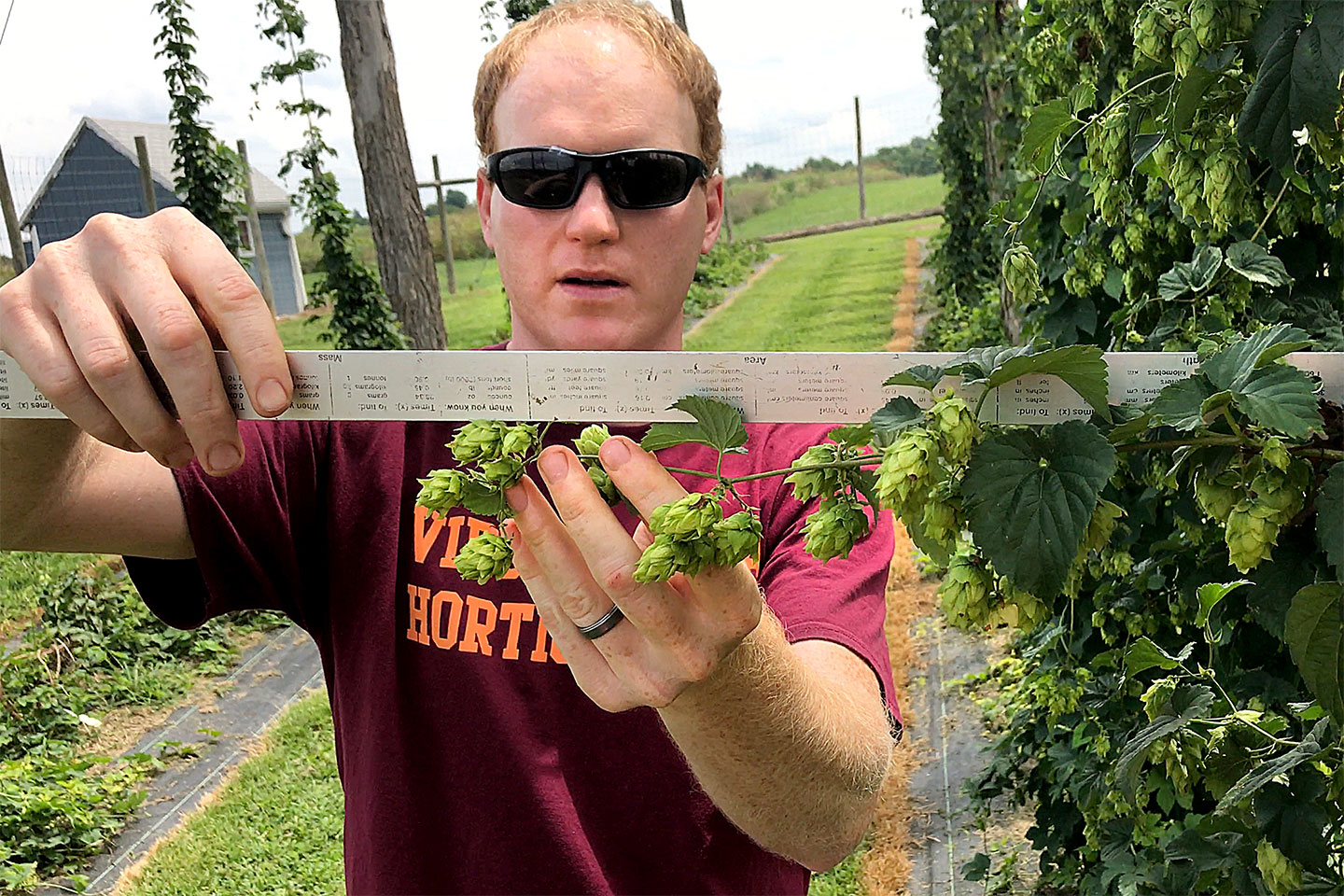
Oenology and viticulture research and outreach efforts on campus and at Agricultural Research and Extension Centers around the state, have also helped put Virginia wine on the map, creating a market for a burgeoning industry valued at $1.37 billion per year.
State-of-the-art methods of raising poultry and crops are changing the face of agriculture in the commonwealth. Drones are just one example of a new technology that is providing Virginia farmers with everything from detailed soil and field analysis to daily monitoring and health assessments of crops and animals. The nimble aerial units are capable of covering large areas and may be equipped to plant fields and spray crops — tasks they are able to complete up to five times faster than traditional machines.
Such technologies, along with Virginia Tech's drive to help position the state as a global leader, are poised to revolutionize the agricultural industry and to ensure that this $91 billion figure continues to rise.
Return to topScientists in the College of Agriculture and Life Sciences are examining how to keep nematodes from spreading diseases in plants.
Protecting Virginia's humans, animals, and plants and offering innovations for a healthier future
Unlocking the mysteries that surround infectious disease to identify health solutions is a cornerstone of Virginia Tech's research agenda.
Zika, malaria, and tick-borne illnesses are among the many infectious diseases that our researchers are working to resolve. A new faculty-cluster hiring approach is bringing specialists in disease modeling, epidemic mapping, genetics, and novel insecticides together to halt the spread of these lethal viruses. These specialists hail from different parts of the university, including the College of Natural Resources and Environment, the Virginia-Maryland College of Veterinary Medicine, and the College of Agriculture and Life Sciences, and will work collaboratively and across disciplines to fight infectious diseases.
This integrative systems approach promises to deliver new innovations in the treatment of disease.
From scientific laboratories to farmers' fields, experts are working to support healthy bee populations and targeting predatory insects responsible for destroying valuable produce. In response to acres of sweet corn, grapes, and apples lost each year to stinkbugs, entomologists are exploiting the bugs' most distinctive characteristic, their smell, to eradicate them. These scientists are also working to combat other bugs that snatch profits from producers, including the kudzu bug and the corn earworm moth.
The controlled release of beneficial Laricobius osakensis, a beetle with the power and appetite to eradicate an invasive insect that has wreaked havoc on entire forests of Eastern hemlock, holds great promise. In conjunction with breeding programs and efforts to preserve valuable genetic material, researchers are using safe and innovative approaches to ensure the health of ecologically and commercially valuable species.
In Roanoke, a partnership between a new research center and local hospitals is helping people with diabetes, obesity, and other conditions to alleviate their symptoms through behavioral modification. Such steps will not only help people make healthier food decisions, they will also drive down the cost of health care.
As Virginia Tech researchers continue to examine health and disease at both the micro and the macro levels and to seek solutions from experts across disciplines, the university is advancing new and novel approaches with the goal of eliminating infectious disease and enhancing human, animal, and plant health.
Return to topStudents conduct research near the Virginia Tech campus that will inform how to ensure healthy drinking water for the state — and the world.
Delivering science and solutions to keep our water clean
As population growth, climate change, urbanization, and other threats pose challenges to our water quality and supply, Virginia Tech researchers — guided by the sobering reality that half of the world's population will reside in water-stressed areas by 2025 — are studying this precious substance in all of its forms and facets.
Scientists are monitoring the infrastructure used to transfer water to help Virginia farmers irrigate effectively.
These data provide vital information about water losses, empowering communities to address leaks and other inefficiencies in their water-transport systems.
In the future, new models incorporating climate analysis, weather trends, and water-use data will make it possible to forecast drought, flooding, and other hazards, months and even years in advance. This predictive capability will provide farmers and entire industries with a sort of crystal ball, enabling them to plan for their water needs and to prepare for weather-related disasters.
Recovering wastewater and nutrients is also critical. When producers were instructed to limit the amount of nitrogen and phosphorous in the Chesapeake Bay, a College of Agriculture and Life Sciences scientist engineered an inexpensive water-quality system that removes up to 90 percent of nitrogen, and 45 percent of phosphorus output, safeguarding the bay — and producers' profits.
Virginia Cooperative Extension agents are also exploring the other side of the equation through the development of safer fertilizers formulated with lower levels of nutrients, such as phosphorus. Novel, automated sensor networks can now identify when irrigation is required, saving growers time, water, and money. And when too much water is the issue, Virginia Tech experts have developed capture systems that collect runoff, allowing growers in the nursery and other industries to recycle this resource.
For consumers, a statewide program offers quick, affordable water testing. Virginia Tech researchers found that approximately 10 percent of Virginia homes served by well water may be contaminated with lead. Identifying whether or not lead and other contaminants are in homeowners' drinking water is the first step to fixing the problem. This simple water test, available through statewide water-testing clinics, could save countless lives.
Return to topJennifer Gagnon (left), a Virginia Cooperative Extension project associate and coordinator of the Virginia Forest Landowner Education Program, works with landowners around the state to manage their forest land.
Preserving our state's natural resources for generations to come
What does it take to cultivate fertile ground from resource-depleted soil? How will experts develop the next generation of environmental monitoring technology to enhance land- and water-management efforts? How will we teach all citizens to be stewards of our land?
Every day, Virginia Tech researchers and Virginia Cooperative Extension agents answer these questions and extend their knowledge to benefit citizens of the commonwealth and the environment in which they live.
The university's footprint extends across the globe as researchers work to pinpoint the amount of carbon released into the atmosphere. This information could change models used by governments to guide major research and policy decisions.
Data on land-cover in urban municipalities, paired with bold, new thinking about the ways in which these cities are classified, could inform not only resource-management decisions, but also our ability to compare and understand changing land-cover patterns in similar cities across the world.
University experts have found that simple changes to land-cover can reap powerful economic, environmental, psychological, and social benefits.
Urban trees, for example, can lower surrounding temperatures by as much as 20 degrees. When trees cast shade on a building, power bills can decrease by $10 each month.
On the state's rural terra firma, experts in the College of Agriculture and Life Sciences are helping producers implement sound conservation practices, such as cover crops, field borders, and grassed waterways, all of which enrich soil and prevent erosion. Once farmers' products are ready for market, Extension is bringing them together with residents, businesses, and non-profits to create thriving and resilient local food systems that benefit local Virginia communities.
Extension is also expanding the university's reach and harnessing the power of volunteers through the Virginia Master Naturalist program. In 2016, volunteers logged more than 146,000 hours, applying their natural resources training in myriad ways, from community naturalist classes to stream monitoring.
In the College of Natural Resources and Environment, researchers partnered with a Virginia-based business to develop monitoring technology to track contaminant plumes and measure nutrient concentrations. The team is moving this state-of-the-art system toward commercialization, benefiting Virginia's environment and economy.
Return to topExtension and Research Funding
(Funding sources for FY2018)
(Funding sources for FY2018)

Virginia Cooperative Extension and the Virginia Agricultural Experiment Station received $168,313,960 from federal, state, and local government, as well as from grants, contracts, and other sources.
7.59% Funds from local government
42.68% State general funds
9.14% Federal capacity grants
40.59% Grants, contracts, and other funds
Value of Volunteers
In 2017, Virginia Cooperative Extension volunteers assisted Extension staff in delivering education programs. These volunteers contributed →
1,002,727 hours of service valued at
$26,822,947*
* Based on Independent Sector 2017 Value of Volunteer Hours by State.
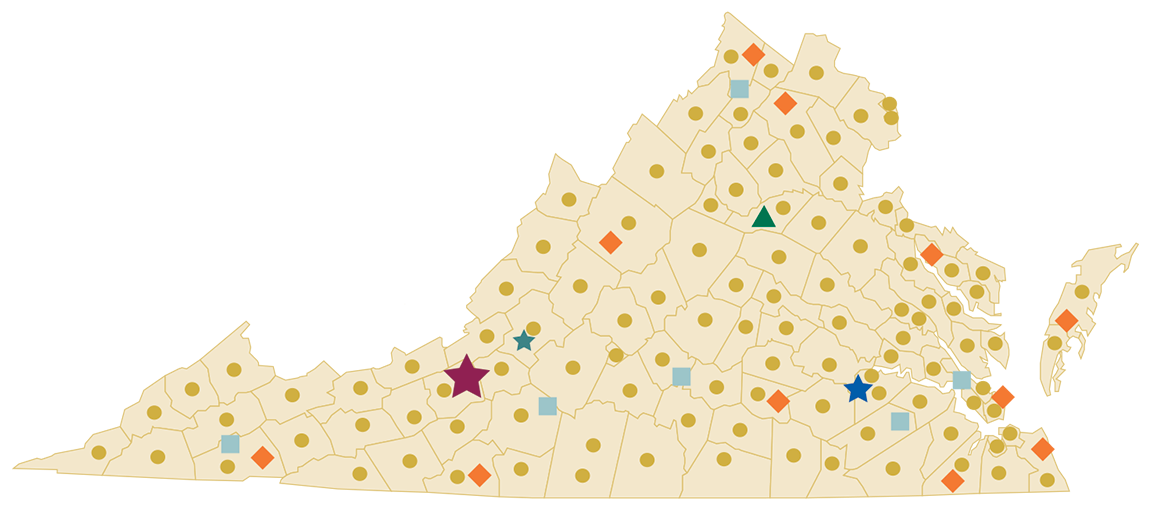
Virginia Tech, Blacksburg Campus
Virginia State University, Petersburg
Center for Transformative Research on Health Behaviors, Roanoke
11 Agricultural Research and Extension Centers
1 Departmental Research Center
6 4-H Educational Centers
108 Local Extension Offices
$1.34
additional amount of funding
Agency 229 generates for every $1 the state invests.
Location of Reseach and Extension Personnel
35%
Virginia Agricultural Experiment Station
65%
Virginia Cooperative Extension
787 FTEs Total number of faculty and staff members for research and Extension
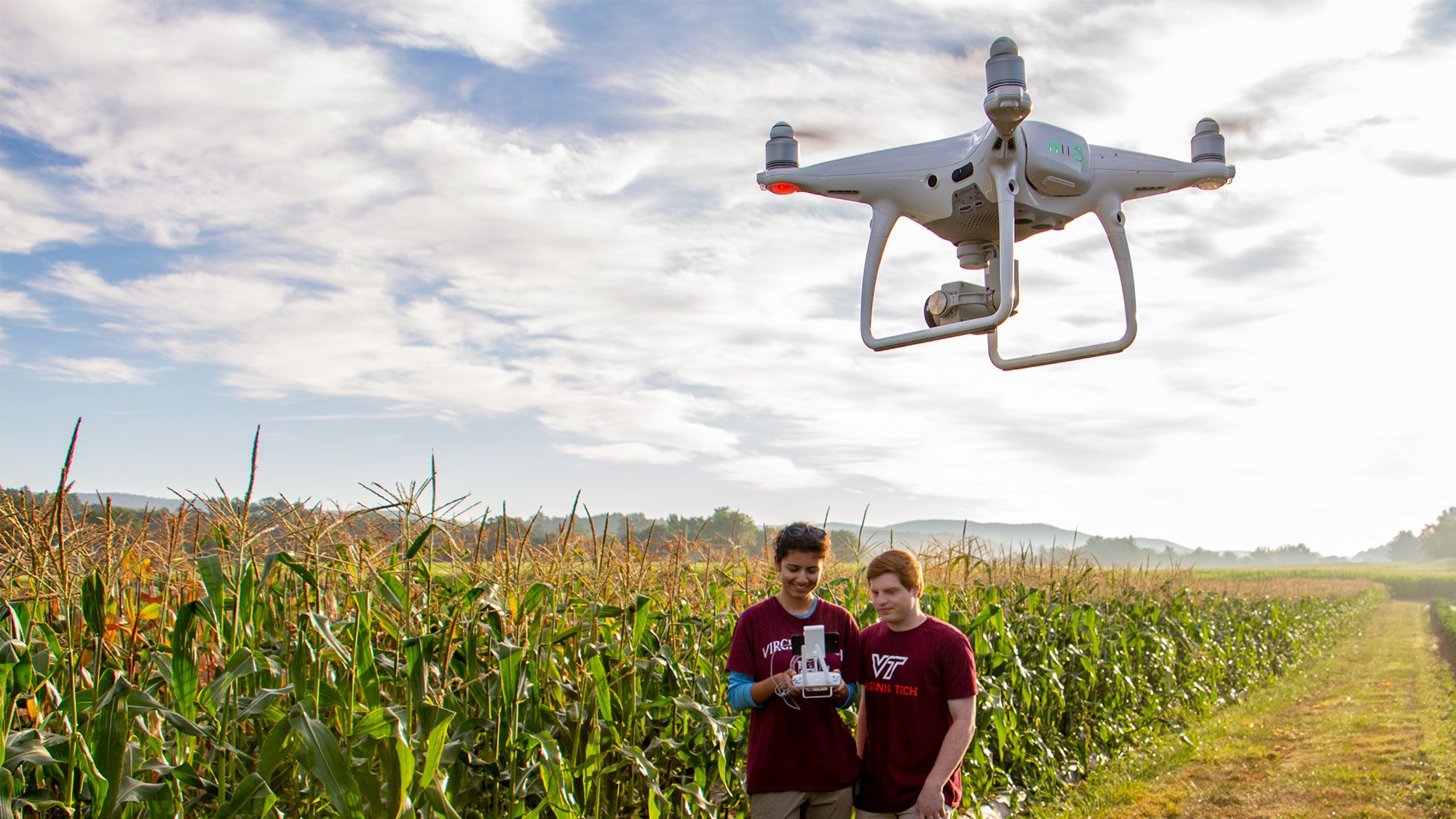
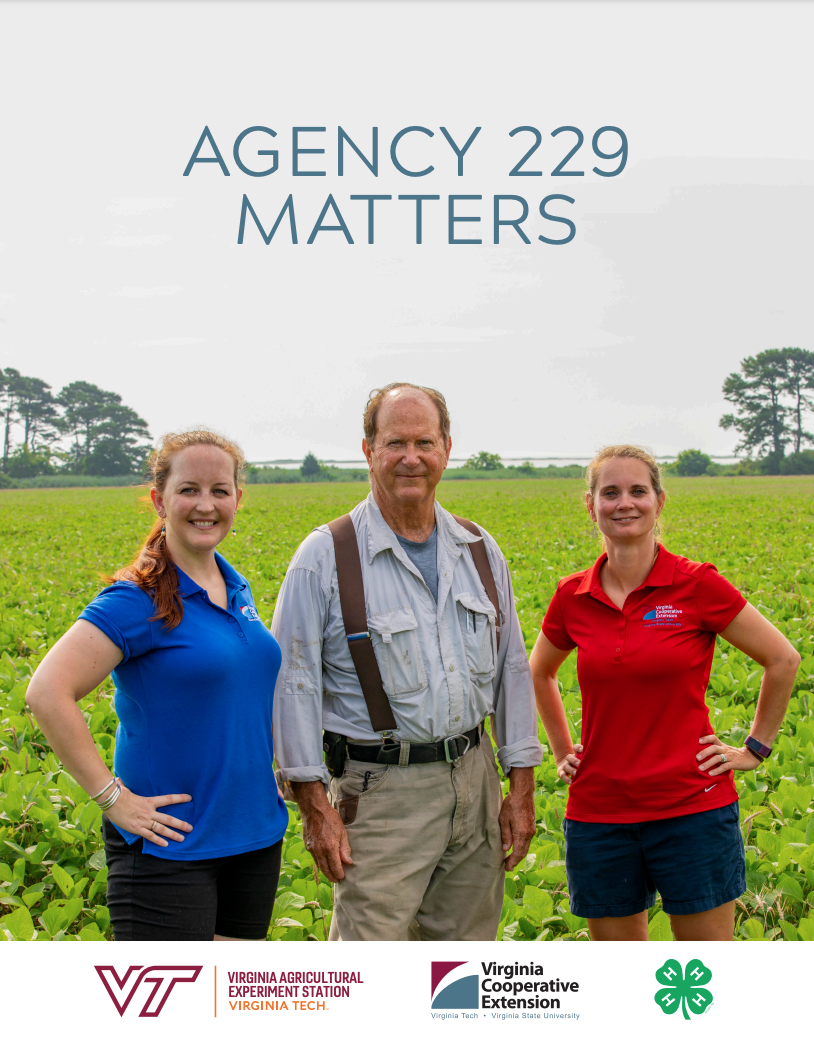
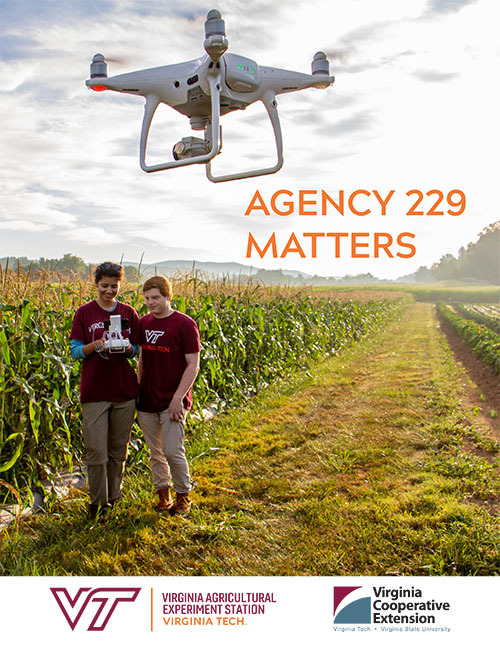
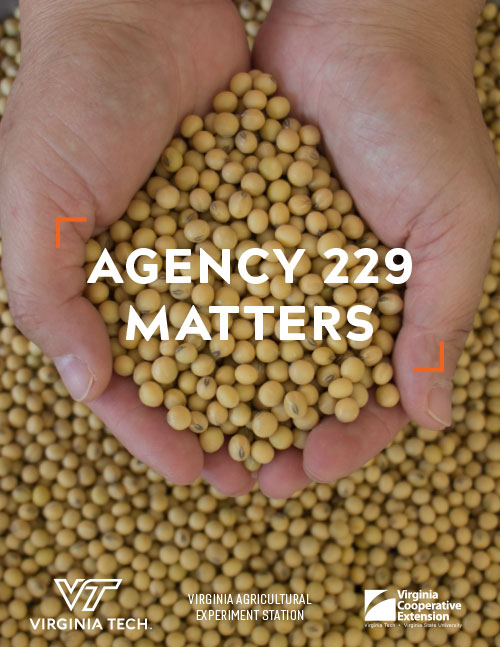
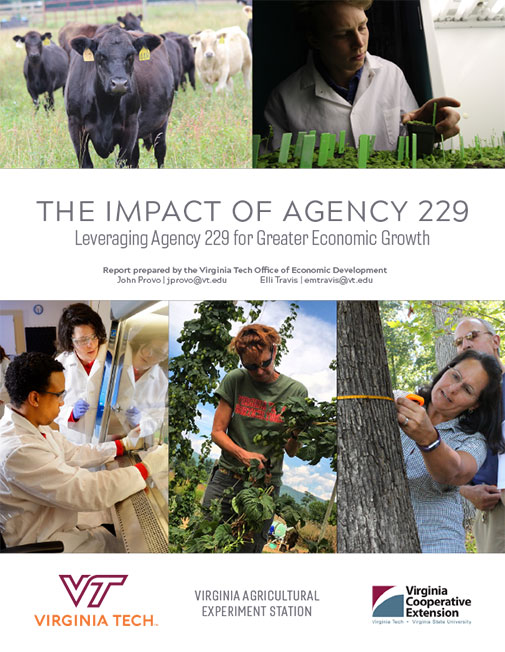

 Food and Nutrition
Food and Nutrition
 Energy
Energy
 Economy
Economy
 Health and Disease
Health and Disease
 Water
Water
 Environment
Environment






